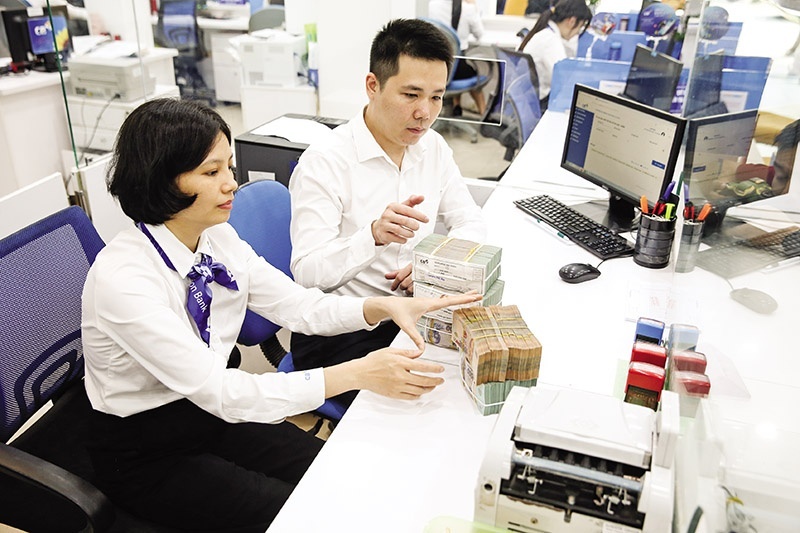Eagle eyes on banking sector crossholding

The Law on Credit Institutions consists of close regulations on stake ownership into banks. How is the current state?
Under the Law on Credit Institutions, an individual could not possess above 5 per cent of the chartered capital in a credit organisation, an organisation could not possess above 15 per cent (except some special cases) and shareholders and relevant people could not possess over 20 per cent of a credit organisation’s chartered capital. These regulations comply with international standards, but in fact not a few credit institutions were controlled by a group of some individuals.
These and many other regulations on the organisation, operation and corporate governance of Vietnam’s banking and financial system are up to international standards, some even stricter, but all legal documents would be neutralised if cross-investment and crossholding existed.
How would legal documents be neutralised?
In fact, the performance of fund management companies, investment funds and securities companies is closely controlled and supervised by the State Securities Commission; banks and financial companies are controlled by the State Bank, whereas financial investment joint stock companies are not governed by any state management body. These companies only need to adhere to the Enterprise Law, meanwhile their operations are similar to that of financial companies and investment funds.
Thereby, some groups of individuals have cashed in on this loophole to form financial investment joint stock companies for stake purchases in some banks, they also bought stakes in these banks. After possessing a relatively high stake level, they, on one hand, borrowed at banks in which they are shareholders, and on the other hand they asked banks in which they and their financial investment companies have stake to pump capital into banks in the group, from there scaling up their power.
Could the economy be put at risk when shareholder groups hold sway over banks?
The threat to the economy, banking system and people could hardly be measurable when shareholder groups hold sway over banks. This was seen in the case of the Asia Commercial Joint Stock Bank (ACB) and some other banks in the past year.
State regulations referring to joint stock commercial bank’s legal capital, on lending to relevant people, on credit quality reporting or on provisioning could turn void when crossholding existed. Banks could invest in forbidden areas like securities and property, and more.
Let’s talk about banks’ capital adequacy rate (CAR). Under current regulations credit institutions are obliged to meet the CAR of at least 9 per cent. At some banks the CAR even reaches 40 per cent.
As per international practice, banks can still handle normal operation and the banking sector is still safe when the CAR reaches 40 per cent and bad debt rate 20 per cent.
In Vietnam, crossholding and cross-investment has driven CAR to high levels. Albeit bad debt rates at some local banks may not stay as high as those in other countries, some banks are still on the verge of going bust and have been put under special control or subject to be merged with other banks. It is lucky that the State Bank has made interventions in a timely manner to rescue feeble banks.
Could you elaborate on banks’ investments into securities and property?
Under current regulations, to venture on securities and property field banks must found separate companies and could not allow companies with their investment to contribute or lend capital. When crossholding or cross-investment existed, it would not be hard to ‘dodge’ these regulations.
Besides, with their influence these powerful shareholder groups may borrow a huge capital amount at banks in which they and their financial investment firms are shareholders and use this money to venture on securities, property or on other banks. This would be perilous when the securities and property markets were going down which trigged soaring bad debts.
What the stars mean:
★ Poor ★ ★ Promising ★★★ Good ★★★★ Very good ★★★★★ Exceptional
Latest News
More News
- The promotion of ESG via banking (November 21, 2024 | 09:32)
- Standard Chartered committed to Vietnam’s financial success (November 21, 2024 | 09:24)
- Full ESG adoption the priority for Agribank (November 21, 2024 | 09:07)
- Banks entice youth with tech advances (November 21, 2024 | 08:00)
- Banks shaping the future as business advisors (November 20, 2024 | 21:00)
- ESG represents a shift towards sustainability for banks (November 20, 2024 | 13:00)
- GGGI supports Vietcombank’s debut of $80 million green bonds (November 20, 2024 | 11:20)
- SHB and the ESG journey: creating social value in every step (November 19, 2024 | 15:00)
- Banking sector contributes to ESG, green growth, and sustainable development (November 19, 2024 | 14:42)
- ESG implementation in banking: from awareness to action (November 19, 2024 | 12:08)




















 Mobile Version
Mobile Version